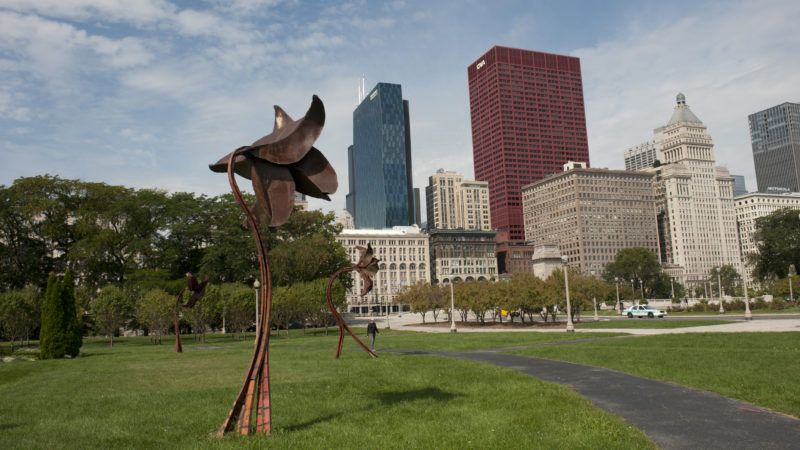Chicago Youth Nonprofit Sues City After Police Raid Over Free Food for Protesters
Chicago used its food licensing laws to harass a nonprofit providing free food to protesters.

A Chicago nonprofit that works on behalf of the city's young adults sued the city this week. The lawsuit was filed by Chicago Freedom School (CFS)—an acclaimed nonprofit that provides support and educational programs for young Chicagoans—against the city, three police officers, and the Chicago Department for Business Affairs & Consumer Protection.
CFS alleges Chicago officials illegally raided a group facility on May 30 after the group offered a safe space to young city residents who had been protesting the police killings of George Floyd and other black Americans. The suit claims the city and its employees violated the First and Fourth Amendments of the U.S. Constitution and Illinois state law, including state civil rights laws.
As the suit details, many protesters were caught off guard by a curfew the suit contends wasn't even announced until anywhere from minutes before, to minutes after, it was set to take effect. Chicago government's failure to notify protesters was exacerbated when the city also halted public transportation and ordered bridges downtown to be raised. Those actions by the city trapped many protesters downtown, both mandating they go home and leaving them without any legal or practical means to do so.
Left without other options, some protesters trapped by the city's furtive curfew and closures sought refuge at CFS after several tweets invited them to do so.
"Two aldermen and other frontline organizers tweeted to let protesters know to head to the Freedom School if they needed free food, or just to charge their phones and drink some water," Block Club Chicago reported. "The school was also organizing rides home for protesters stranded due to the curfew and [transit] stoppage."
Police came, too, accompanying city regulators, the suit details. Once there, they "demanded entry" to the CFS facilities. Rebuffed, the suit alleges, they "conducted an illegal raid." Inside, they claimed they saw CFS "serving large quantities of food without a proper retail food establishment license."
CFS counters that it bought commercially made pizzas and snacks (including bottled water and Clif bars) for the protestors.
"[CFS] provided hungry young people with take-out pizza, granola bars, and bottled water," says attorney Joey L. Mogul of the People's Law Office in Chicago, which is representing CFS in its suit against the city, in an email to me this week. "Practically every youth organization in the City of Chicago provides young people the same types of food as part of their programming and practice."
Indeed, CFS appears to be no more an unlicensed foodservice establishment than is a church that offers communion wafers to congregants, an office that buys lunch for employees and guests, a soccer team that provides orange slices to players, or a nonprofit that offers thousands of free meals to Chicago police officers.
So why this raid? Mogul tells me the raid was "retaliation" against CFS by city police and regulators "for supporting the protestors and the demonstration against racist police violence."
I can't imagine the city will win this case. It deserves to lose. And I certainly hope it does.
But I think there's also a much larger point here. Chicago officials appear to view a community nonprofit that serves young black adults as some sort of licensing scofflaw because it bought and gave away free pizzas. Chicago officials also appear to believe that responding to that charitable act necessitated sending armed police officers to the nonprofit's doorstep.
If that's how Chicago officials treat nonprofits that serve vulnerable young members of the black community there, how must they treat black-owned for-profit businesses?
That's not a Chicago-only problem. Not by a long shot. Consider this black-owned Baltimore business was raided by police so many times its owner sued the police—and won. In a column last month, I discussed the terrible history of armed police actions against unlicensed food vendors in New York City, many of whom are immigrants and people of color.
And if a spurious licensing raid results in a criminal record?
"Laws restricting licensing opportunities for workers with criminal records have a disproportionate impact on Black and Hispanic workers," a 2015 report prepared by the Obama administration noted.
For all these reasons and more, licensing reform must be a part of any effort to reduce the harms visited by the state upon black Americans and other marginalized communities. But first, Chicago's mayor, police department, and consumer protection head must apologize to the Chicago Freedom School and the young adults the group's work benefits.


Show Comments (68)